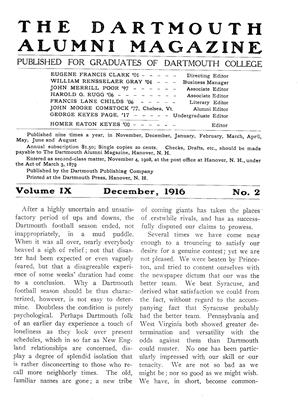We copy here a communication to the New York Evening Post of October 17, to show the esteem in which Dr. Brown was held by all who knew him, outside as well as within Dartmouth circles. The letter follows:
"May I pay a layman's tribute to the noble preacher and teacher whose career ended unexpectedly yesterday, and is appreciatively chronicled in your columns today?
"The Rev. Dr. Francis Brown, president of Union Theological Seminary, was at once a product and a professor of the modern school of Biblical study and exegesis. His faith was far too deep and too well reasoned to fear any light that research could shed on its foundations. If anything merited his scorn, it was pusillanimity on the part of Christian believers.
"To those aware of his profound religious convictions, his trial for heresy was obviously absurd, and there could be no doubt of its issue. To some theologues, so annoying an experience would have had its compensation in the consciousness, that, for awhile, they were very much in the public eye; but to Dr. Brown this was an added annoyance. To no one was notoriety more distasteful.
"He was, primarily, a servant of the Lord, and secondarily a scholar. His accomplishments and achievements in the latter capacity were recognized well beyond the limits of his own denomination. Some years ago the writer had occasion to ask the late Bishop Potter to contribute an introduction to 'The Bible for Children.' On learning that Dr. Brown was to write a preface for the book, 'Then there can be no need of my co-operation,' exclaimed the Bishop; 'by comparison with such a scholar, lam but a layman.' Nevertheless, he kindly undertook the task and executed it to admiration. Strongly contrasted types of churchmen, these two; but broadminded and devout, both of them, and each in his way admirably fitted for leadership in the religious life of this great city.
"A fine and highly trained mind was Dr. Brown's, and high-mindedness spoke in his every word and action. Paying little attention to the arts of the orator, he was none the less a fluent and effective speaker. And when occasion warranted, his pen was capable of producing essays not lacking in literary charm.
 View Full Issue
View Full Issue
More From This Issue
-
 Sports
SportsVARSITY FOOTBALL
December 1916 -
 Class Notes
Class NotesCLASS OF 1910
December 1916 By Slurgis Pishon -
 Article
ArticleAfter a highly uncertain and unsatisfactory
December 1916 -
 Article
ArticleFRANCIS BROWN
December 1916 By John King Lord '68 -
 Article
ArticleAT PLATTSBURG
December 1916 By Morton C. Tuttle '97 -
 Article
ArticleMEETING OF THE ALUMNI COUNCIL
December 1916








